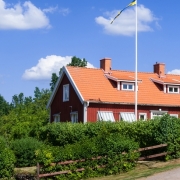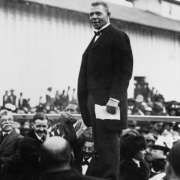One mission of the Poetic Justice Warrior Society is to recognize the unsung heroes of Western Civilization. While many of the honorees are well known characters, others are relatively obscure. For example, Anders Chydenius triggered the Swedish economic miracle, John Harrison pioneered global positioning systems, and Edward Lloyd created the information age. Yet no one, so far, is more obscure than John Scotus Eriugena. According to historian Thomas Cahill,
John Scotus is the first philosopher of the Middle Ages, the first truly Christian philosopher since the death of Augustine in 430, the first European philosopher since the execution of Boethius in 524, and the first man in 300 years who was able to think. He also had a vicious sense of humor.
To put Scotus (Eriugena was added to clarify that he was Irish born) in perspective, it’s important to offer a very brief history of Western Civilization before St. Thomas Aquinas published Summa Theologica in the 13th century. Classical Greece’s Golden Age began in the 5th century BC including Aristotle’s Ethics. Rome’s Golden Age begins in the 1st century BC including Cicero’s Five Canons of Rhetoric. In the 5th Century AD, Alaric the Goth sacks Rome, the empire falls, and the European continent sinks into five hundred years of anarchy, violence, disease, illiteracy, and ignorance – the Dark Ages. Except in Ireland; Saint Patrick had arrived.
It is not possible to exaggerate the plight of mainland Europeans after the fall of Rome and the rising power of the Catholic church. After all, St. Augustine had declared in his Confessions that all of mankind was to be damned for Adam’s original sin, the very act of conception had polluted every child in the womb; and in his book, The City of God, he declared that Rome was to be punished for its pre-Christianity sins and pagan deities.
According to historian William Manchester, “The City of God was the first great work to shape and define the medieval mind. One was the medieval man’s total lack of ego. Even those with creative powers had no sense of self.” This is despite the fact that in Confessions, the self-obsessed Augustine was the first to use the word “I” with the meaning we assign to it today. Heaven for me, hell for thee?
The Holy Roman Empire
As French philosopher Voltaire observed, it was neither holy, nor Roman, nor an empire. After several generations of brutality, relative order returned to central Europe in the form of feudalism. Victorious tribal chieftains became princes, established fiefdoms, and the Vatican fought to expand its influence and power. In the 840s AD, John Scotus crossed the English Channel to France and took up residence at the Palatine School in Paris under the patronage of King Charlemagne’s successor. According to Cahill, Scotus revealed his Celtic heritage with his favorite word, nature, much to the chagrin of Roman Christians and Platonists for Scotus had proclaimed,
Every authority that is not confirmed by true reason seems to be weak, whereas true reason does not need to be supported by any authority.
A wonderful metaphor would be – the US Constitution, whereas the Declaration of Independence. At the time, he was one of only two residents of Western Europe to be fluent in Greek. The other one was incredulous that a barbarian Irishman would know so much Greek. As Cahill writes about Scotus’ book The Division of Nature,
Here is a mind that could grasp the most rarefied distinctions of the Greek philosophical tradition, and more important, could elaborate a new system of thought, one that is balanced and internally consistent. To Scotus, nature is a virtual synonym for reality.
John Scotus’ contributions to Western Civilization are his intellectual courage in the face of secular and religious authority, and his position as the master link that connects the violence of anarchy to the peace of personal liberty. The fall of Rome to the Enlightenment. He was the brightest star among the invading army of Irish monks (but a layman himself) who were armed only with their books. To Charlemagne, they seemed to be everywhere, and according to his biographer and servant Einhard, “he loved the wandering monks.”
In 1225, Pope Honorius ordered all copies of The Division of Nature to be burned, much like the Bishop of Paris condemned Aquinas’ Summa Theologica fifty years after that, for the same reason. Reason.
New Life
With the fall of Roman civilization, infrastructure crumbled, skilled trades disappeared, long distance commerce ceased, libraries burned and books turned to dust, but not in Ireland. It had been totally insulated from Roman culture and already lived its own brand of fun-loving fighting Irish brutality and illiteracy. Its history includes Celtic tribes crossing the Irish Sea from Europe and displacing Ireland’s inhabitants in the 4th century BC.
In 432 AD, then Bishop Patrick arrived in Ireland for the second time. Although he was a contemporary of Augustine and lived Roman traditions in Britain, Patrick owned a philosophy that was opposed to both. According to Cahill, Romans never traveled outside the Imperium and into pagan lands.
So Patrick was really a first, the first missionary to barbarians beyond the reach of Roman law. His love for his adopted people shines through his writing, and it is not just a generalized Christian benevolence, but a love for individuals as they are.
St. Patrick worried for their spiritual and physical welfare. As Victor Hugo illustrated so vividly 1400 years later, Patrick believed new life could be found within every soul, not just the mystical waters of baptism. The horror of slavery was never lost on him, and nearly within his lifetime, the Irish slave trade came to a halt. While Roman lands were decivilizing from peace to utter chaos, Patrick was civilizing Irish warrior clans by refusing to be afraid of them. He showed them it was possible to be brave and also be a man of peace.
Under St. Patrick’s leadership, small cities were formed around monasteries scattered throughout Ireland. These inspired scholastic communities of scribes led by abbots and abbesses (heavens!) who preserved and copied manuscripts including the Greek and Roman classics. These were rescued from barbarian destruction in mainland Europe by people seeking peace and safety for themselves in Ireland, and eventually Irish founded communities in Britain.
The Light of the Dark Ages
As poetic justice would have it, from the middle of the 5th century through the 6th, Ireland ironically became Europe’s custodian for literacy and the literature that eventually fed Europe’s newly organizing universities. Poetic Justice Warrior John Scotus Eriugena transformed the humanity and courage of St. Patrick into the intellectual heft of reason, purpose and pride that was the essential ingredient for The Enlightenment and Western Civilization.













